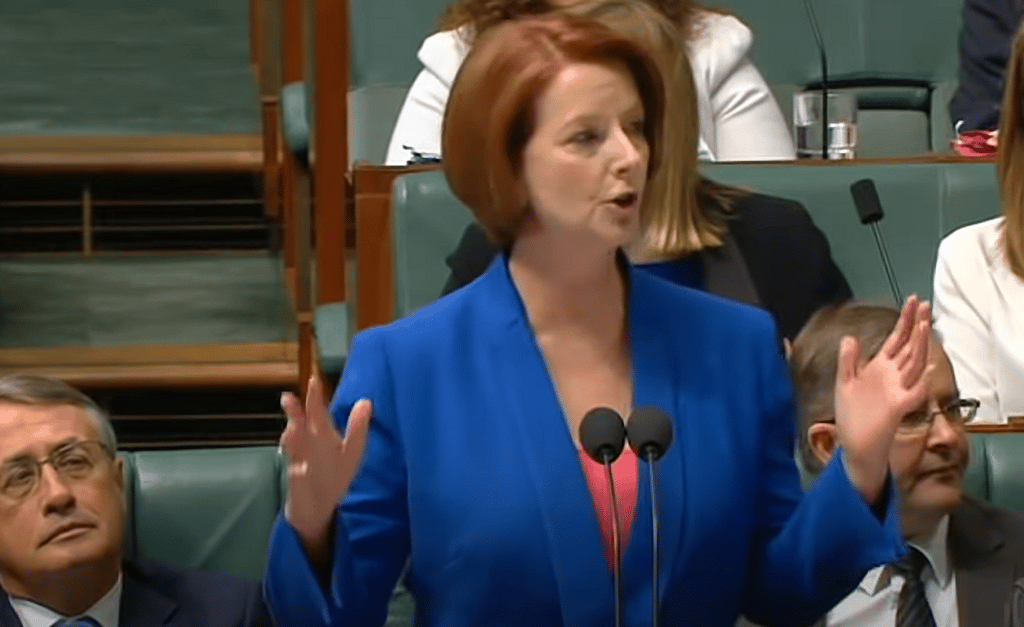The misogyny’s still here, ten years since former prime minister Julia Gillard declared she would “not be lectured by that man” on misogyny.
And the frustration was there, ten years ago when Gillard shared those words, which later went viral to become one of the most well-known speeches of our time and forever remembered as “The Misogny Speech”. Perhaps the frustration in 2012 was a little more subtle or cautious. We now know that Gillard’s frustration had been rising for some time before spilling into that moment. She’d seen the opposition leader standing in front of “ditch the witch” signs. She’d been the target of numerous sexist comments from megaphones like Alan Jones, who declared Gillard’s father had “died of shame”.
And mostly, Gillard had copped it, in silence. Until that speech.
She’d been silent, likely because she was Australia’s first female prime minister. She was up against gendered double standards. Her earring choices were criticised, the cut of her jackets examined. The nature of her relationship and family life was questioned, her body parts were made fund of: like the actual menu item from an actual restaurant: “Julia Gillard Kentucky Fried Quail – small breasts, huge thighs and a big red box.”
Gillard couldn’t win. Too tough, too weak, too strong, too powerful, too unmarried.
She had bitten her lip to let the sexism play out around her, likely always questioning the ramifications should she personally note what so many others were already feeling and questioning.
But when Gillard herself was accused of sexism by Opposition leader Tony Abbott, she broke.
That was it, the piece that “propelled” her to act as she once said on the moment. And act she did in a spectacular way. She said later that she had her office create some talking points – a long list of the sexist things Abbott had said, and the many times he’d remained silent around the misogyny of others. She jotted some notes as Abbott spoke. She connected the pieces, and then she delivered.
I remember the day of that speech well. It’d been a few months since we launched Women’s Agenda. We were still feeling things out, wondering what this would publication would be and if we’d find the audience for the stories we were covering. We watched the speech live in the office, reporting back on what she said. The word “finally” came up from those around me and I felt it myself. Despite personally having plenty to say about some of Gillard’s policies and her previous speeches (sometimes but not always positive), at that moment, I was very much backing the prime minister and willing her on. The speech seemed to carry the potential of a turning point for what would not be acceptable not only in politics but elsewhere. And not just in Australia, but all across the world as the speech went viral and took on a life of its own. Things would change. The frustration had boiled over and would create a new standard. Not now, not ever. Never again.
Ten years on and away from that moment, we know things are not that simple. The past decade has been unpredictable, and difficult and raised more and more questions. MeToo, Black Lives Matter, escalating climate-related disasters, a COVID pandemic which heightened gender inequalities globally and exposed the crisis across the underpaid and undervalued care sector.
The expectation that the United States would see a woman elected President, only to end up with Donald Trump.
A continued churn of prime ministers in Australia: Tony Abbott, Malcolm Turnbull, Scott Morrison. The latter of whom oversaw a government determined to believe that their “problem with women” was either a myth or a problem that would disappear with time.
So what’s changed? First, Morrison was very wrong. He missed how the frustration of women manifests and builds with momentum, even when there are setbacks. We saw it in the large numbers of women running for office, not just in Australia but all over the world.
They’re not only frustrated by misogyny and the lack of representation but also fed up with leadership that has failed to act on the most critical issues of our time. They have felt a sense of urgency, noting the lost years, lives, and potential in failing to act on equality, climate action, integrity, racism, domestic and family violence and other issues.
The Federal election saw how such frustrations can manifest in powerful ways, with a large cohort of women running as independents winning once-thought-safe seats against large party machines.
Sexism still exists. Misogyny is still there. It’s in the media, in boardrooms, in sport, in business, in politics and elsewhere. It’s on the street, where women and girls continue to be harassed.
Julia Gillard once said it’d be easier for the next female prime minister, and then easier again for the one after that.
Is it easier to speak up about sexism and misogyny now, than ten years ago? It is, for some. For others, it’s not. The power imbalance continues and can be far more acute for Indigenous women, women with a disability, those from culturally diverse backgrounds and others. A speech from one of the then most powerful women in the world can help for some in certain situations, but it doesn’t stop the sexism and misogyny occurring. We only need to look at the past ten years of politics in Australia to know that.
What we do know is that frustration can build into something pretty powerful. If you can speak up, do so. You never know who or how many people are watching.


